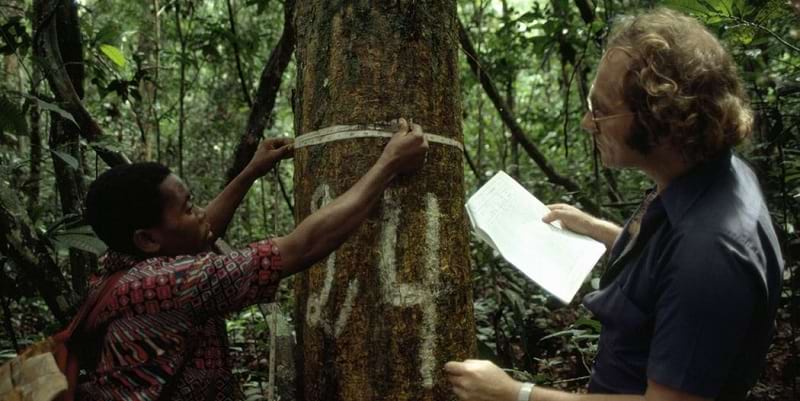Field Research explained

Field research: this article explains the concept of field research in a practical way. The article starts with the definition of this term, followed by a general explanation and some practical examples of field research. You will also find an explanation of the various methods and a step-by-step plan for conducting field research. Enjoy reading!
What is field research?
Field research, also known as fieldwork, is a method of collecting raw data outside of the lab, library, or usual workplace.
It involves observing and interacting with people, animals or phenomena in their natural environment to gain a deeper understanding of their behavior, social interactions and the dynamics of their environment. Read more about experimental research.
Field research methods vary by field. For example, biologists observe animals in their natural habitats, and social scientists conduct interviews and observations to study human societies.
The definition of Field research
Field research is a qualitative research method that focuses on observing and understanding individuals, groups, communities or society as a whole.
It aims to capture authentic and contextual data by immersing researchers in the environments they study.
Through direct observation and interaction with subjects, field researchers gain firsthand insight into their behaviour, beliefs, cultural practices and social structures.
It encompasses a wide variety of well-defined methods, including:
- Formal interviews
- Informal interviews
- Direct observation
- Participating observation
- Collective discussions
- Analysis of personal documents
- Self-analysis
- Offline and online activities
Although this type of research is mainly qualitative, it can also contain quantitative aspects, depending on the research goals and methodologies applied.
History and the origin of Field research
Field research has a long history, especially within cultural anthropology. Anthropologists have made extensive use of field research to study different cultures, often focusing on so-called primitive cultures or cultural differences based on factors such as class.
The term “field” refers to defined areas of research, such as education, industrial environments or Amazon rainforests, where social research is conducted.
Influential figures in the early development of this type of research include Alfred Radcliffe-Brown and Bronisław Malinowski, who laid the foundations for future work in anthropology.
Field research versus laboratory research
Field research and laboratory research differ in their approach to data collection.
Field research takes place in natural environments, where researchers make direct observations and interact. It provides contextual data and insight into complex processes, but may be limited in establishing causal relationships.
On the other hand, laboratory research takes place in controlled environments, where variables are manipulated and repeatability is ensured.
It is well suited for testing hypotheses and obtaining accurate measurements, but may lack the complexity of natural environments.
Both approaches complement each other and the choice depends on the research questions and available resources.
Research Methods For Business Students Course
A-Z guide to writing a rockstar Research Paper with a bulletproof Research Methodology!
Methods for field research
Field research involves the use of various methods to collect valuable data and gain insight into the phenomena under investigation.
Here are some common methods applied in field research:
Direct observation
This method involves carefully observing people, animals, or events in their natural environment. By watching closely, researchers can study behaviors, interactions, and responses to specific situations without actively participating.
Participating observation
In this method, the researcher actively participates in the group, community, or environment under study. By participating in activities, having conversations and being involved in daily routines, researchers can develop a deep understanding of the social structures, norms and values, and the meaning attached to certain actions.
Qualitative interviews
This includes conducting interviews with individuals or groups to find out their perspectives, experiences and opinions. By asking open-ended questions and delving deeper into topics, researchers can gain insight into participants’ thoughts and feelings.
Data analysis of documents
In this method, documents, such as letters, diaries, reports, or other written materials, are analyzed to obtain information and insights. These documents can provide valuable context and provide a historical perspective on the issues examined.
Informal conversations
Sometimes having informal conversations with people in the research environment can yield useful information. These can be casual chats during breaks or informal gatherings where people talk freely about their experiences and perspectives.
The use of these different methods allows researchers to collect a wide range of data and develop an in-depth understanding of the social, cultural and behavioral aspects of the phenomena under study.
Case studies
Case studies are a useful approach in field research to gain in-depth insights into specific situations, groups or phenomena.
Step-by-step plan for conducting field research
Follow the steps below to get started conducting field research yourself.
Step 1: define your research goal
Determine the specific goal of your research. What do you want to discover, understand or observe? Clearly formulate your research question(s) and objective(s).
Step 2: design your research plan
Consider which methods and approaches are best suited to your research question. Consider the location, participants/population, data collection methods and time frame.
Step 3: Get permission
If necessary, obtain permission from relevant agencies, organizations or individuals to access the study site and collect data. Make sure you follow ethical guidelines and procedures.
Step 4: collect data
Go to the research site and start collecting data according to your research plan. This may include direct observation, interviews, surveys, participant observation or collection of documentation.
Step 5: Analyze and interpret your data
Evaluate and analyze the collected data. Identify patterns, themes or trends relevant to your research question. Interpretation of the data should be based on accurate and systematic analysis.
Step 6: draw conclusions and formulate results
Based on your analysis and interpretation, you come to conclusions that answer your research question. Formulate clear results and present them in a structured way.
Step 7: Report and share your findings
Write a research report describing the methodology, findings and conclusions. Share your results with the scientific community, stakeholders or the wider public through publications, presentations or other appropriate channels.
Step 8: Reflect and Evaluate your field research
Take the time to evaluate your research experience. What were the strengths and challenges of your research? What would you do differently in the future? Reflect on possible improvements and learning points for subsequent studies.
Examples of known field studies
Numerous interesting discoveries have been made while conducting research. Here are three examples of discoveries made while conducting this type of research:
New animal species
Field research has led to the discovery of several new animal species. For example, in 2018, during a field research expedition in the rainforests of Ecuador, researchers discovered a new species of tree frog.
This discovery highlighted the importance of field research in identifying biodiversity and understanding the ecological systems in which these species live.
Ecological changes
Field research has also helped identify ecological changes and understand their causes.
For example, by studying coral reefs in different parts of the world, scientists have found that coral bleaching, a consequence of climate change, is having a devastating effect on coral reef health.
These discoveries have led to awareness and action to protect and conserve these endangered ecosystems.
It’s Your Turn
What do you think? Do you recognize the explanation about field research? Have you ever heard of this type of research before? Have you ever conducted this yourself? What do you think are the advantages compared to, for example, research in a laboratory? Do you have tips or other comments?
Share your experience and knowledge in the comments box below.
More information
- Barick, R. (2021). Research Methods For Business Students. Retrieved 02/16/2024 from Udemy.
- Burgess, R. G. (Ed.). (2003). Field Research: A sourcebook and field manual (Vol. 4). Routledge.
- Burgess, R. G. (2002). In the field: An introduction to Field Research (Vol. 8). Routledge.
- Edmondson, A. C., & McManus, S. E. (2007). Methodological fit in management Field Research. Academy of management review, 32(4), 1246-1264.
- McKinnon, J. (1988). Reliability and validity in Field Research: some strategies and tactics. Accounting, Auditing & Accountability Journal, 1(1), 34-54
How to cite this article:
Janse, B. (2023). Field Research. Retrieved [insert date] from Toolshero: https://www.toolshero.com/research/field-research/
Original publication date: 08/21/2023 | Last update: 01/02/2024
Add a link to this page on your website:
<a href=”https://www.toolshero.com/research/field-research/”>Toolshero: Field Research</a>












